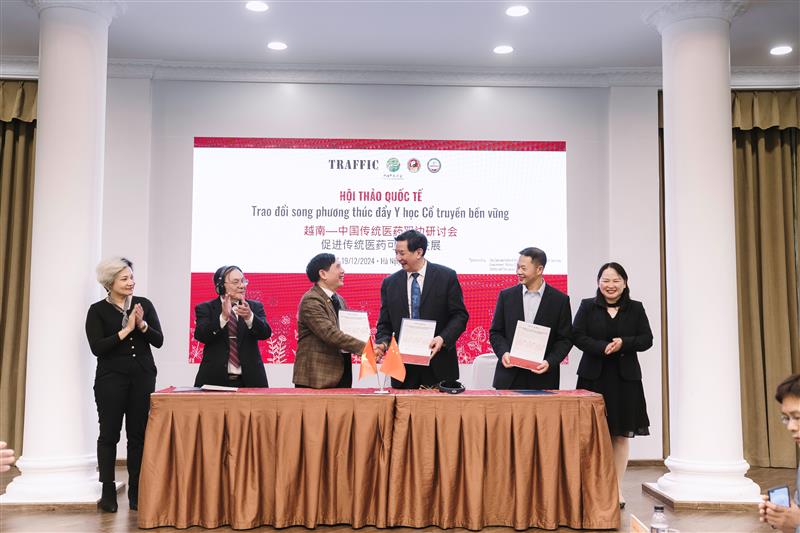Viet Nam and China FORGE Historic Partnership to Advance Sustainable Traditional Medicine Industry and Protect Endangered Species
- Viet Nam and China launch landmark partnership to adopt sustainable traditional medicine (TM) practices that protect wildlife while preserving cultural heritage.
- TM, rooted in centuries of shared knowledge, increasingly threatens wild species as global demand rises.
- Leading TM associations signed first-of-its kind agreement to eliminate illegal wildlife products and promote sustainable sourcing.
- The new partnership sets a global model for responsible TM that could help to safeguard some of the world’s most endangered species.
In a groundbreaking move, Viet Nam and China have launched an unprecedented partnership to transform their traditional medicine (TM) industries into global models of sustainability, safeguarding biodiversity while preserving centuries of cultural heritage.
TM in these countries reflects centuries and millenniums of shared insights rooted in cultural application practices.

Top image: Glue made out of tiger bones and rhino horn
Bottom Image: Rhino horn
However, with the global popularity of TM rising, concerns are mounting over the industry's reliance on wild-sourced plants and animal ingredients, which puts immense pressure on ecosystems and endangered species, such as pangolins, tigers, and rhinos.
In Viet Nam alone, an estimated 50,000 tons of herbal materials, valued at $440 million annually, are consumed for medicinal purposes.
Dr. Do The Loc, Vice President of VOTMA, said:
This partnership marks a new chapter in traditional medicine - one that honours our ancestral wisdom while actively protecting the natural world that sustains it. As Vietnamese traditional medicine no longer accepts illegal wildlife products, we are showing how the sector can thrive while contributing to conservation. Our collaboration with the CATCM will help establish new standards for the entire region."
The partnership, facilitated by TRAFFIC and the TM associations of Viet Nam and China, brought together 28 policymakers, pharmaceutical leaders, and researchers to help foster legal, sustainable, and environmentally conscious practices.
Mr Liu Zhanglin, Executive Vice President of CATCM, underscored the significance of the collaboration:
With globalization intensifying, partnerships like this are essential. The progression of traditional medicine is met with various challenges, notably regarding cross-border intellectual exchange and the spread of cultural practices. China and Viet Nam, with their extensive experience in traditional medicine, have engaged in broad-ranging collaboration within trade and healthcare sectors. By uniting our expertise, we can drive sustainable TM practices that protect biodiversity and enhance human health."
The event culminated in the signing of a historic pledge by representatives from the Viet Nam Oriental TM Association (VOTMA), the China Association of Traditional Chinese Medicine (CATCM), and leading research institutes. This agreement establishes a framework for sustainable TM practices that could serve as a model for other nations.
The partnership will focus on developing sustainable sourcing guidelines, advancing plant-based alternatives, and fostering ongoing cross-border collaboration. Future initiatives may include joint research, practitioner training programs, and industry standards to ensure TM’s responsible growth.

As the world grapples with biodiversity loss, this collaboration signals a transformative approach to TM — one rooted in sustainability and shared responsibility.
Trinh Nguyen, TRAFFIC Viet Nam Office Director, emphasized the partnership's global potential:
This pledge demonstrates the power of collective action in preserving both biodiversity and cultural heritage.This collaboration sets a new standard for responsible traditional medicine practices that could benefit future generations.”
Notes:
This meeting was co-organised by TRAFFIC offices in Viet Nam and China, as part of an initiative implemented by WWF (World Wide Fund for Nature) Germany, and with financial support of the German Federal Ministry for the Environment, Nature Conservation, Nuclear Safety and Consumer Protection (BMUV).
This initiative aims to contribute to the reduction of demand and consumption of rhino horn in Viet Nm and China, supporting efforts to curb poaching and preserve endangered species while promoting sustainable practices in traditional medicine.
About TRAFFIC

TRAFFIC is a leading non-governmental organisation working to ensure that trade in wild species is legal and sustainable, for the benefit of the planet and people.
About China Association of Traditional Chinese Medicine (CATCM)
The China Association of Traditional Chinese Medicine (CATCM), founded in December 2000, is a non-profit organisation made up of TCM companies, research units, universities, and individuals. With 500 enterprise members and over 70 branches, CATCM prioritises the conservation of wild species and ecological balance. The association advocates for sustainable TCM development, promoting the use of artificial breeding and cultivation to protect wild resources from illegal exploitation. CATCM guides the TCM industry toward eco-friendly practices, balancing resource use with biodiversity preservation to ensure the long-term availability of medicinal resources.
About The Viet Nam Oriental Traditional Medicine Association (VOTMA)
The Viet Nam Oriental Traditional Medicine Association (VOTMA) is a socio-professional organisation for Vietnamese citizens practising Oriental medicine and pharmacy. It plays a key role in developing and preserving Viet Nam's Oriental medicine, uniting practitioners both domestically and abroad to contribute to public healthcare. VOTMA collaborates with the health sector to integrate and modernise Oriental and Western medicine, aiming to make Oriental medicine a scientific field that reflects Viet Nam's cultural identity. It also promotes public awareness through media outlets, spreading knowledge on disease prevention and treatment with Oriental medicine.
About Viet Name Institute of Medicine and Pharmacy Research (VIMPHAR)
Viet Nam Institute of Medicine and Pharmacy Research (VIMPHAR) was established in 2017, operating under the Viet Nam Union of Science and Technology Associations. In June 2017, VIMPHAR received a certificate of registration for scientific and technological activities from the Ministry of Science and Technology of Viet Nam.
VIMPHAR's primary functions are to assemble researchers to evaluate the clinical effects and therapeutic efficacy of Viet Namese ethnic medicine formulas for drug production and treatment applications. VIMPHAR also cultivates genetic resources of medicinal plants to conserve and develop Viet Nam's rare herbal materials. Additionally, VIMPHAR aims to establish herbal material zones, traditional medicine plant conservation areas, and eco-tourism sites to promote the biodiversity of medicinal plants. With the motto "unleashing potential - elevating health" VIMPHAR formulas aspires to become a reputable and trusted name in traditional medicine, taking responsibility towards the community and society.





